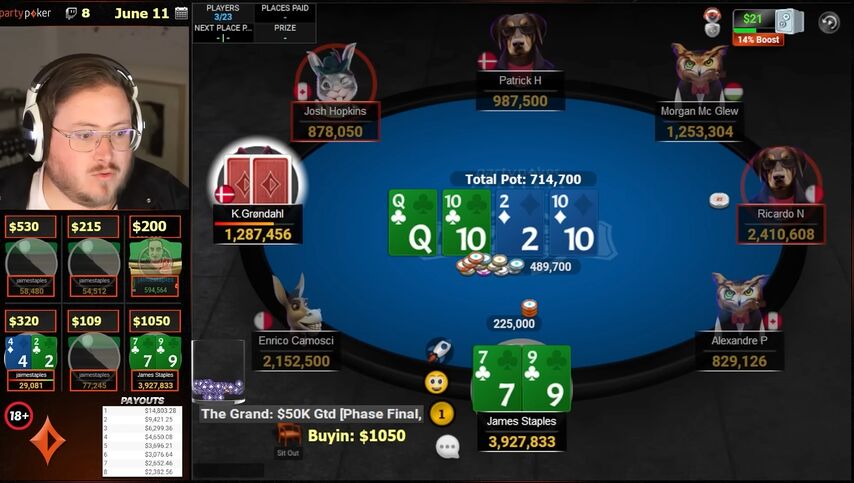Being in the lead is another way of saying, you are winning, but what is a lead in poker?
A lead can mean three different things in poker.
- The player who starts betting on the flop, turn, or river, even though they weren’t the player who raised previously.
- Having a better hand than your opponents at the current moment in time.
- Having the chip lead in a tournament or cash game.
This article will focus on the first reason, which is known as a betting lead.
A betting lead in poker is when a player bets before others, also known as “leading out” or “taking the betting lead”.
You need to know when and why to lead in poker, so that’s what this guide is all about.

What is a Lead in Poker? (Clear Examples)
When a player leads, it means that they weren’t the player driving the aggression in the last betting round. They’ve gone from making passive actions, to being the aggressor, and betting.
Let’s imagine you have pocket Aces in a game of online poker. Of course, you want to make a raise preflop and build a nice pot for yourself, so thats what you do.
After your raise, two players decide to call, and the flop is dealt. Before it’s your turn to act, anther player slides out a bet. Instead of waiting for the last aggressor to continue betting, that player has made a lead.
This change from being passive (and calling the raise) to being aggressive by betting first, is the definition of a lead.
Who Usually Takes the Betting Lead in Poker?
In a game of poker, there’s a rhythm that almost every poker hand follows.
When a player raises preflop, they are usually expected to continue with another bet on the flop. In our picture here, you’ll see Patrik Antonius raising preflop with K K, then following up with a bet on the flop.
This is traditionally how the betting rhythm works. It doesn’t matter what position Antonius is in at the table; if he made a preflop raise, we’d usually expect a continuation bet on the flop.

When you begin a hand with a preflop raise, you generally want to continue that aggression on the flop and subsequent streets. Of course, there are situations where you may want to check instead of a continuation bet, but we are generalizing.
The continuation bet gives you fold equity and if your opponent calls, they will usually check on the turn, where you can reevaluate.
What is Leading With a Donk Bet?
Let’s say you make a raise preflop and get three players who call your raise. When the flop cards are dealt, another player makes a bet, instead of waiting for you to continuation bet.
This is a “donk bet” in poker, also known as leading out or betting into the preflop raiser.
Look at our example from Hustlers Casino. Charles had raised preflop, but instead of letting him continuation bet on the flop, Brad takes the lead. He bets $10,000 into a pot of $8,900, which is quite large.
When you lead with a donk bet, you become the aggressor in the pot. Players will usually expect you to continue this aggression.

Is a Donk Bet Lead a Good Idea?
When you use a donk bet strategy in specific situations, it can win you a lot of chips.
Some professionals say that flopping bottom or middle set (three-of-a-kind) is a good situation to use a donk bet lead. When you hit a set, your opponent can still have strong hands, meaning top pair, two pair, plus overpairs and draws. You can get some extra chips from these hands by donk betting.
Other hands with strong draws and healthy equity can donk bet because of the additional fold equity they get. If your opponent calls, you still have a great chance of making a strong hand combination.
Here we see Jamie Staples streaming a tournament on partypoker. He chose to lead the turn with his flush draw and fold equity.

Donk betting for value can work, but players are usually out of position when they donk bet. This means they’ll have to continue betting each street for maximum value, but won’t be able to raise their opponent (unless they raise you).
Donk betting can be especially profitable on low-stakes online poker tables. Many recreational players are too loose postflop, so your donk bets are more likely to be called.
Take a look at our list of reviewed poker sites to get into these loose games.






What to Do When You Face a Donk Bet Lead
Sometimes, it can be a little confusing when another player donk leads into you. You made the preflop raise and displayed aggression, so why are they betting now?
Right away, start thinking about the hands that your opponent has.
- Players sometimes donk bet when they have a very strong draw, such as a straight and flush draw (known as a combo draw).
- If a player flops a hand like bottom set, they may donk bet to get value from the preflop raiser. The reasoning behind it is, you don’t want to risk your opponent checking and seeing a free turn card.
- Alternatively, your opponent might donk bet when they think you have not connected with the community cards.
Whether you should call, fold, or 3-bet when you face a 3-bet requires a bit of studying. We recommend that any serious player gets familiar with ranges. When you understand ranges better, you’ll know which hands you should call, fold, or 3-bet.
We’ve got free trials on range analysis programs, like ICMIZER and Flopzilla, meaning you can learn at no cost.
Another way to get practice is through free tournaments, called freerolls. Since leading can be tricky and may take some learning at the beginning, it’s best if you are playing for free.
That doesn’t mean you are playing for nothing though. Our roster of freerolls come from many different poker sites, which have real cash prizes or tournament tickets to bigger events.
- Increased first deposit bonus
- Increased rakeback and reloads
- Help with deposits and cashouts
- Access to private freerolls
- Round-the-clock support























